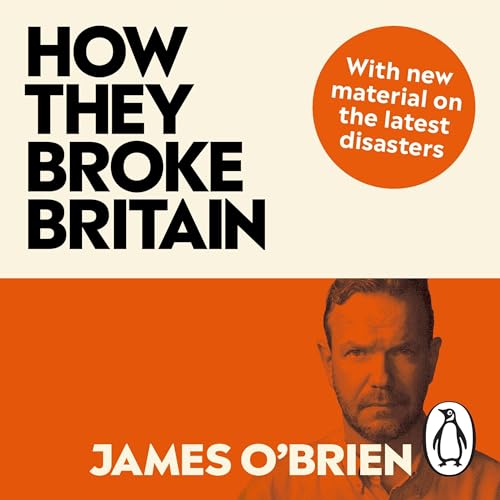James O’Brien – How They Broke Britain Audiobook
James O’Brien – How They Broke Britain Audiobook

- Setting the Scene:
- James O’Brien introduces the reader to a Britain that seems to be in the throes of significant political and social turmoil.
- He provides an overview of the key issues he will explore, emphasizing the importance of understanding how political decisions have shaped the country’s current state.
Brexit and Its Aftermath
- The Brexit Vote:
- O’Brien meticulously dissects the 2016 Brexit referendum, highlighting how a combination of political maneuvering, misinformation, and emotional appeals led to the vote to leave the European Union.
- He examines the campaigns on both sides, particularly focusing on the “Leave” campaign’s use of slogans like “Take Back Control” and the controversial claim that leaving the EU would free up £350 million a week for the NHS.
- Post-Referendum Chaos:
- The immediate consequences of the Brexit vote are explored, including the political chaos, leadership changes, and the economic uncertainty that followed.
- O’Brien discusses how the referendum revealed and exacerbated deep divisions within British society, between different regions, classes, and age groups.
Political Leadership
- Key Figures:
- O’Brien scrutinizes the roles of key political figures such as David Cameron, who called the referendum; Theresa May, who struggled to negotiate a withdrawal agreement; and Boris Johnson, who ultimately led Britain out of the EU.
- He analyzes their leadership styles, decisions, and the ways in which they communicated (or failed to communicate) with the public.
- Impact on Democracy:
- The book delves into how these leaders’ actions and the overall handling of Brexit have affected public trust in the political system.
- O’Brien argues that the continual promises and subsequent disappointments have contributed to a sense of cynicism and disillusionment among voters.
Media Influence
- Role of the Press:
- The influence of the British media, particularly tabloids like The Sun and The Daily Mail, is examined in depth.
- O’Brien critiques how certain segments of the media have prioritized sensationalism and partisanship over factual reporting, thereby shaping public opinion in divisive ways.
- Misinformation and “Fake News”:
- The book discusses the spread of misinformation and “fake news,” driven by both traditional media and social media, and its impact on Brexit and other political issues.
- O’Brien highlights specific examples where misleading information has had tangible effects on public perception and policy.
Economic Issues
- Austerity Measures:
- The economic policies of consecutive governments, particularly austerity measures introduced after the 2008 financial crisis, are scrutinized.
- O’Brien argues that these policies have disproportionately affected the most vulnerable in society, exacerbating inequality and social resentment.
- Public Services:
- The state of public services, including the NHS, education, and welfare, is explored, with O’Brien suggesting that their decline has contributed to public dissatisfaction and disenfranchisement.
- He discusses how austerity has led to underfunding and staff shortages, making these services less effective and more politically contentious.
Cultural Divisions
- Exploiting Divisions:
- The book examines how political figures and movements have exploited cultural divides for their own gain, tapping into issues of immigration, national identity, and sovereignty.
- O’Brien discusses the rise of nationalist sentiments and the ways in which politicians have leveraged these to gain support.
- Regional Disparities:
- Significant attention is given to the regional disparities within the UK, including the differences in economic prosperity and political preferences between London and other regions.
- O’Brien talks about how these divides have been both a cause and a symptom of broader political instability.
Solutions and Hope
- Restoring Trust:
- Despite his critical tone, O’Brien offers a vision for how Britain can begin to heal its divisions.
- He emphasizes the importance of restoring trust in political institutions, suggesting reforms that could make the system more transparent and accountable.
- Media Accountability:
- The book calls for greater accountability in the media, advocating for higher standards of journalism and more rigorous fact-checking mechanisms.
- O’Brien stresses the need for consumers to critically evaluate the news they consume and seek out reliable sources.
- Addressing Inequality:
- Economic policies aimed at reducing inequality and improving public services are discussed as essential steps towards creating a more cohesive society.
- O’Brien suggests that targeted investments in healthcare, education, and welfare could help alleviate some of the pressures fueling populism and division.
Conclusion
- Call to Action:
- The book concludes with a passionate call to action for British citizens to engage more actively in the democratic process.
- O’Brien urges readers to be vigilant, informed, and proactive in holding their leaders to account.
- Optimism for the Future:
- While acknowledging the significant challenges ahead, O’Brien remains cautiously optimistic that through collective effort and responsible leadership, Britain can overcome its current struggles.
- He suggests that a more informed and engaged public can be the key to driving positive change and rebuilding a more united nation.
Overall, “How They Broke Britain” by James O’Brien offers a thorough and incisive critique of the political, economic, and social factors that have led to the current state of the UK. It encourages readers not only to understand these issues in depth but also to think critically about the future and their role in shaping it.